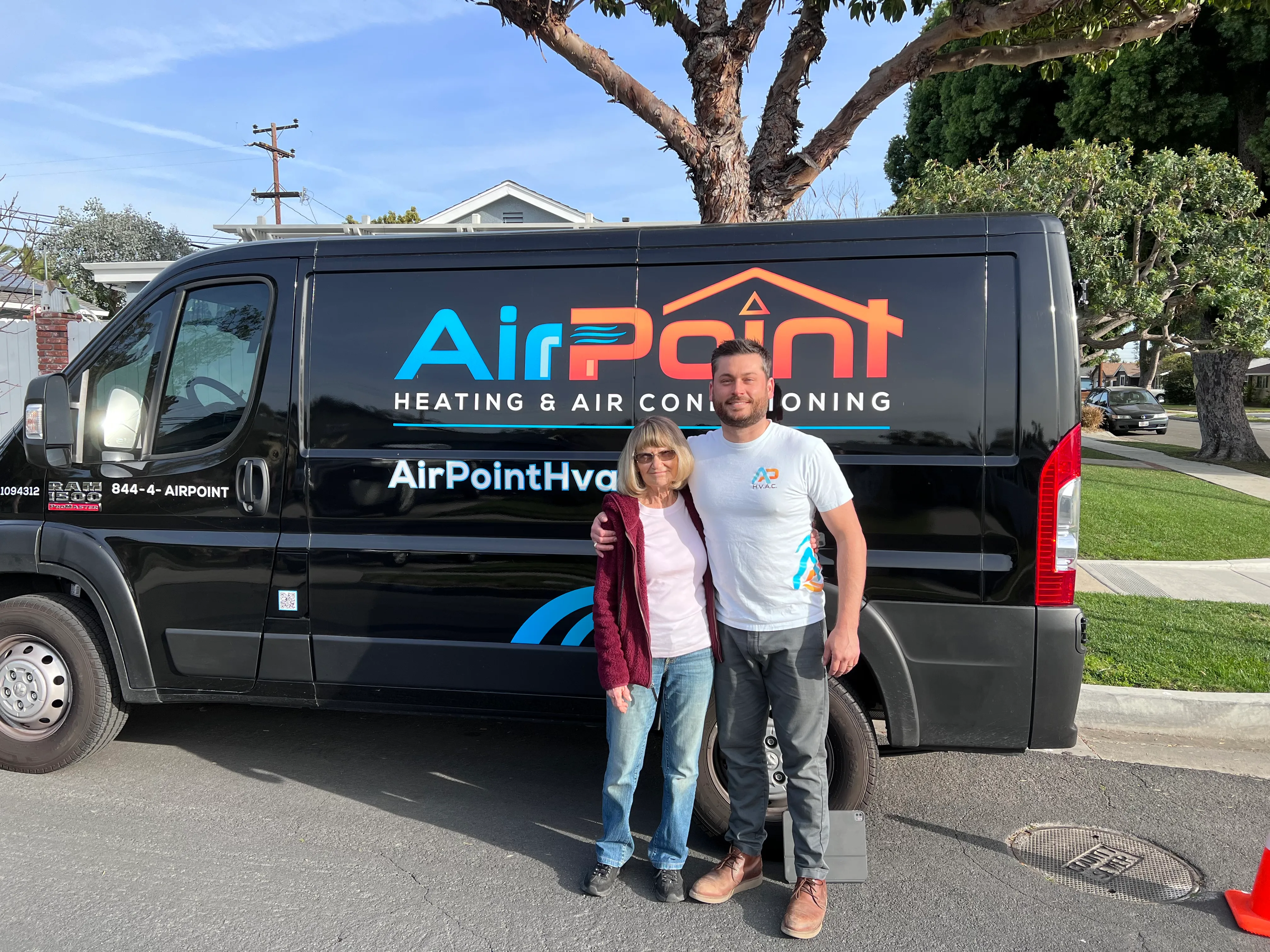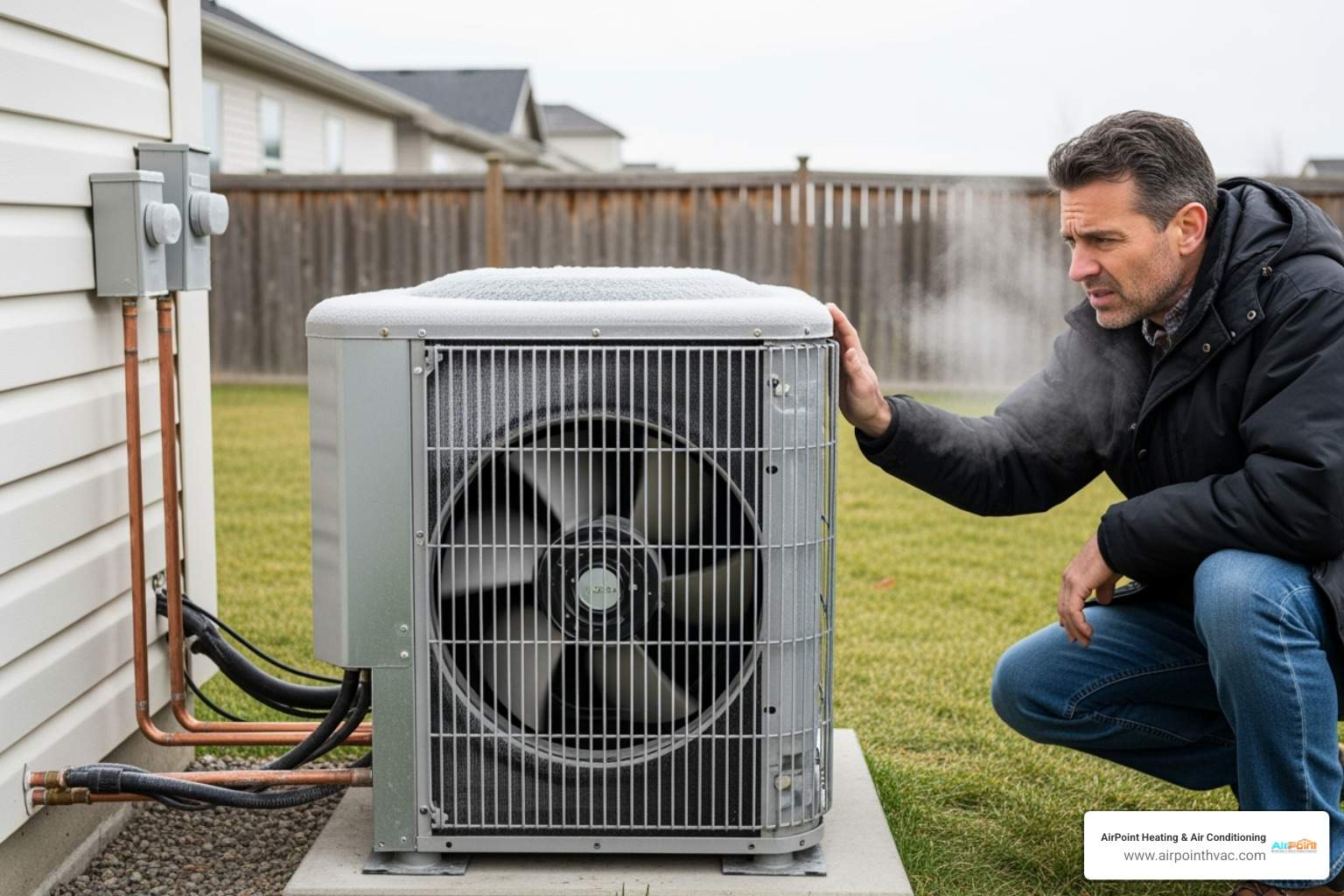
Understanding Why Your Heat Pump Keeps Running
If your heat pump keeps running constantly, you're dealing with one of the most common HVAC concerns homeowners face. While some continuous operation can be normal during extreme weather, a system that never shuts off often signals underlying problems that need attention.
Quick Answer: Top Reasons Your Heat Pump Won't Stop Running
- Dirty air filter - Restricts airflow, forcing longer run times
- Wrong thermostat setting - Fan set to "ON" instead of "AUTO"
- Low refrigerant levels - System works harder to maintain temperature
- Frozen outdoor coils - Prevents proper heat transfer
- Undersized system - Can't meet your home's heating/cooling demands
- Poor insulation - Conditioned air escapes, system compensates
A heat pump running non-stop isn't just annoying - it creates real problems for Los Alamitos homeowners. Constant operation drives up energy bills, puts excessive wear on expensive components like compressors, and often means your home isn't reaching comfortable temperatures.
The good news? Many causes have simple solutions you can check yourself, while others require professional diagnosis to prevent costly system damage.
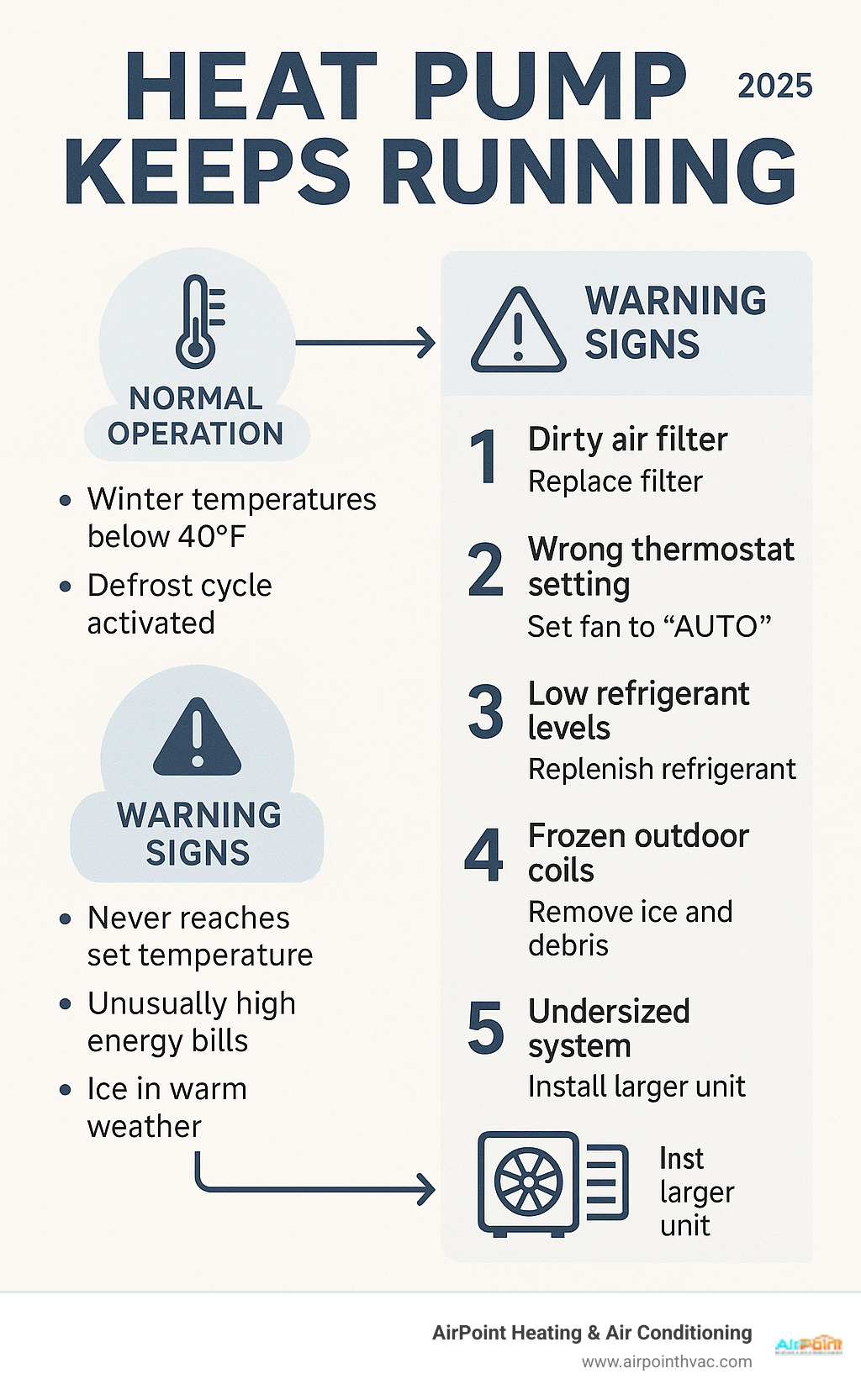
Is It Normal for a Heat Pump to Run Continuously?
This is probably the most common question we hear from concerned homeowners in Los Alamitos. The answer isn't as straightforward as you might hope - it really depends on several factors, including the season, outdoor temperature, and how your system is performing.
Heat pumps work differently than traditional furnaces or air conditioners, and understanding their normal behavior is crucial for knowing when something is actually wrong. Unlike a furnace that creates heat by burning fuel, your heat pump moves existing heat from one place to another - and that process can require some pretty extended run times under certain conditions.
The key difference between normal operation and a problem isn't always how long your system runs, but how well it's performing while it runs.
| Feature/Condition | Normal Continuous Operation | A Malfunctioning System |
|---|---|---|
| Winter Operation | Expected when outdoor temperatures stay below 40°F - your heat pump works harder to extract heat from cold air | Runs constantly but can't reach your set temperature, or your energy bills spike dramatically |
| Below 40 Degrees | Longer cycles are normal as the system extracts maximum heat from frigid outdoor air | Ice buildup that doesn't clear during defrost cycles, or backup heat strips run constantly |
| Summer Cooling | Should cycle on and off regularly to maintain comfortable temperatures | Runs non-stop but your home stays warm and humid despite the constant operation |
| Defrost Cycle | May appear to run constantly during defrost - this clears ice and is totally normal | Defrost activates too often, fails to clear ice, or the unit stays frozen for hours |
| Auxiliary Heat Strips | Brief engagement during very cold weather or defrost cycles to supplement heating | Constantly running even when it's not extremely cold outside |
| Maintaining Temperature | Consistently holds your desired temperature, even during extended run periods | Struggles to reach or hold the temperature you've set on your thermostat |
| Energy Performance | Bills are reasonable considering outdoor temperatures and longer run times | Energy costs are much higher than normal for similar weather conditions |
| System Sounds | Normal operating sounds like fan noise and light humming | Grinding, screeching, banging, or excessive vibration during constant operation |
Is It Normal for a Heat Pump to Keep Running in Winter?
Yes, it's often completely normal for your heat pump to keep running during winter months - especially when temperatures drop below 40 degrees. Here's why this happens and when you shouldn't worry about it.
Unlike furnaces that generate heat by burning fuel, heat pumps work by extracting heat from outdoor air and moving it inside your home. When it gets colder outside, there's simply less heat available to extract, which means your system has to work longer and harder to gather enough warmth to keep you comfortable.
Think of it like trying to collect rainwater during a light drizzle versus a downpour - you need to leave your bucket out much longer when there's less water falling. Your heat pump faces the same challenge with heat during cold weather.
Modern variable-speed compressors are actually designed to run more continuously at different speeds rather than cycling on and off frequently. This approach is more efficient and provides steadier comfort than the old start-stop method. These systems can dial down to lower capacities and run longer to precisely match your home's heating needs.
The colder it gets, the longer your heat pump will run - and that's perfectly normal. A heat pump working constantly in freezing weather is usually doing exactly what it's supposed to do, not signaling a problem.
When Constant Running in Summer Is a Red Flag
While extended run times make sense in winter, a heat pump that keeps running constantly during summer cooling season is usually a sign of trouble. In warm weather, your system should cycle on and off as it removes heat from inside your home and releases it outdoors.
If your heat pump runs non-stop in cooling mode but your home feels warm or humid, something's definitely wrong. Common summer culprits include low refrigerant levels that prevent proper heat transfer, airflow problems from dirty filters or blocked vents, or an undersized system that simply can't keep up with your home's cooling demands.
Summer is when constant running becomes a red flag rather than normal operation. Your system should be able to cool your home effectively and then take breaks - if it can't, it's time to call in the professionals at AirPoint Heating & Air Conditioning for a proper diagnosis.
Why Your Heat Pump Keeps Running: Common Causes and Solutions
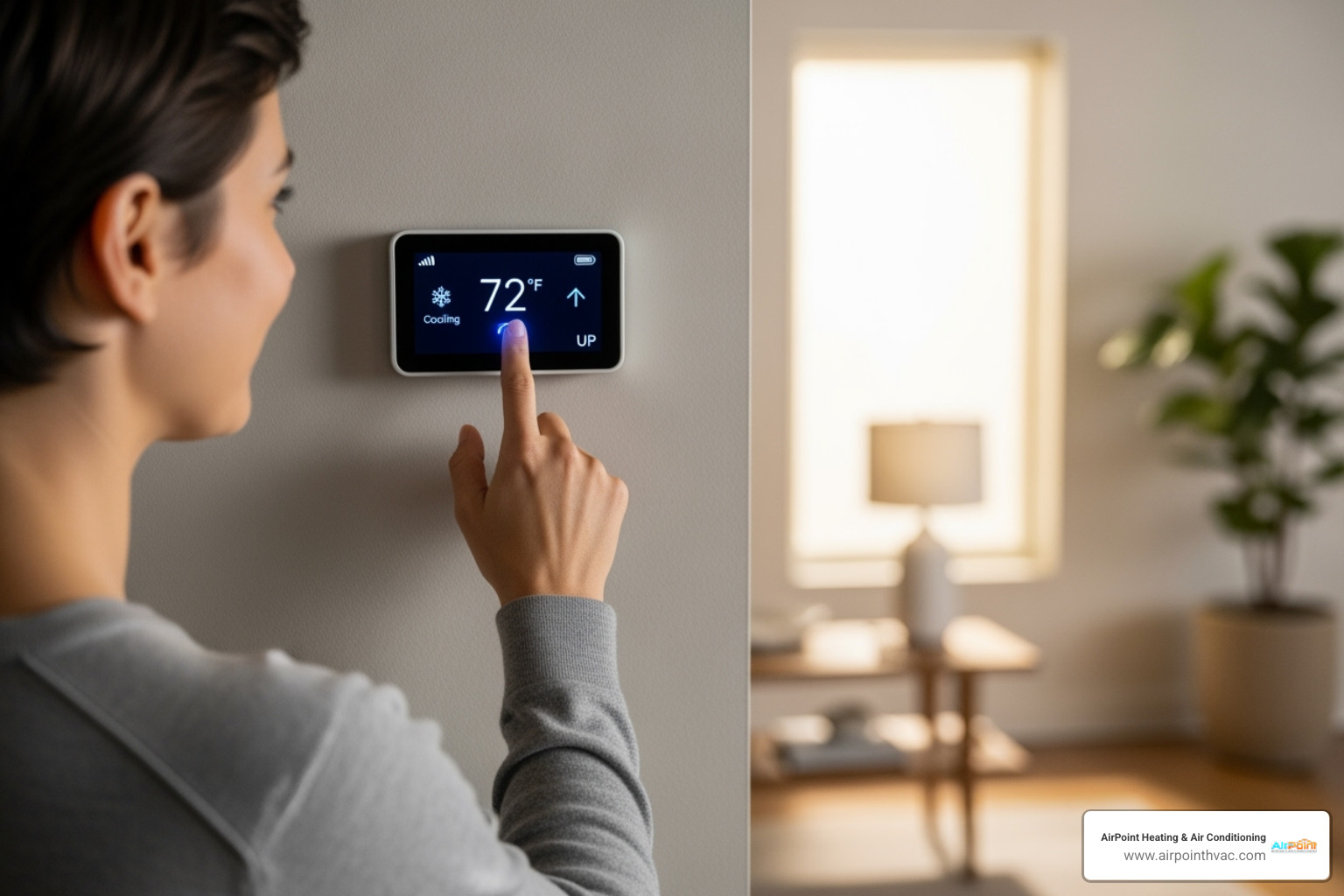
When your heat pump keeps running non-stop, it's like having a car engine that won't turn off - something's definitely not right. The good news? Many causes have surprisingly simple solutions you can check yourself before calling in the professionals.
Understanding what's causing your system to run constantly starts with knowing where to look. Some issues are as simple as a dirty filter, while others involve complex mechanical problems that need expert attention. Let's walk through both categories so you can tackle what you can and know when it's time to call for backup.
Simple Fixes You Can Check Yourself
Before you start worrying about expensive repairs, there are several quick checks that could solve your heat pump keeps running problem today. These are the "low-hanging fruit" of HVAC troubleshooting - easy wins that cost little but can save you big.
Start with your air filter - this little component causes more problems than you'd imagine. When your filter gets packed with dust, pet hair, and everyday debris, it's like trying to breathe through a pillow. Your heat pump has to work overtime just to pull air through the system. Check your filter monthly during heavy-use seasons, and don't be surprised if it needs changing more often than you think. The Department of Energy says a clean filter can boost your system's efficiency by 15%. You can find detailed guidance on how to keep the air filter clean for optimal performance.
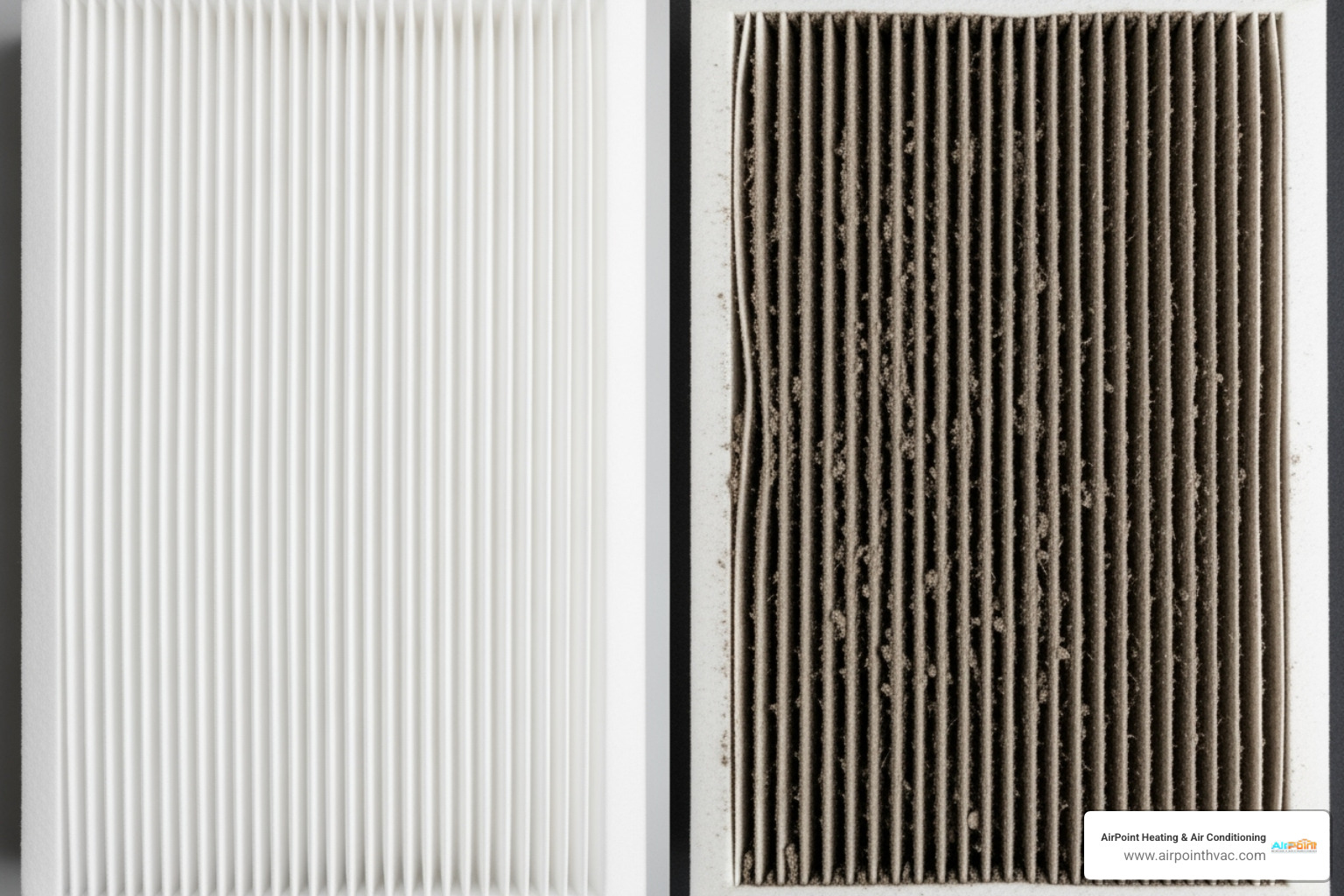
Your thermostat might be the culprit without you even realizing it. If the fan setting shows "ON" instead of "AUTO," your system's fan will run continuously whether it's heating, cooling, or just sitting there. Switching to "AUTO" tells the fan to only run when actively conditioning air. Also, double-check that someone hasn't set the temperature to an extreme setting that forces your system into overdrive mode.
Look around your home for airflow blockers that might be strangling your system. Furniture pushed against vents, curtains draped over registers, or rugs covering return air grilles can all force your heat pump to run longer. Your system needs to breathe freely through all its vents to work efficiently.
Step outside and inspect your outdoor unit for obvious problems. Leaves, snow, ice, or debris around the unit can block airflow and force longer run times. Your outdoor unit needs clear space on all sides to exchange heat properly. If you find ice buildup in mild weather, that's a red flag pointing to deeper issues.
Quick DIY Troubleshooting Checklist:
- Switch thermostat fan from "ON" to "AUTO"
- Replace dirty air filter immediately
- Clear all blocked vents and registers inside
- Remove debris around outdoor unit
- Check that circuit breaker hasn't tripped
- Confirm all doors and windows are closed tight
Mechanical and Electrical Issues Causing a Heat Pump to Keep Running
When the simple fixes don't solve your problem, you're likely dealing with internal system issues that require professional diagnosis and repair. These problems can cause serious damage if left untreated, so don't delay getting expert help.
Low refrigerant is a silent system killer that makes your heat pump work constantly without success. Refrigerant is what actually moves heat around your system - without enough of it, your heat pump is like a delivery truck with no cargo. You might notice reduced heating or cooling performance, ice forming on the outdoor unit even in mild weather, or strange hissing sounds. Refrigerant doesn't just disappear - low levels usually mean there's a leak somewhere that needs professional attention.
A frozen outdoor unit turns your heat pump into an expensive ice sculpture. While some frost is normal in winter, thick ice coating means your defrost cycle isn't working properly or airflow is severely restricted. When coils freeze solid, heat transfer stops completely, forcing your system to run continuously while producing little to no heating. This creates a vicious cycle where the harder your system works, the more problems it develops.
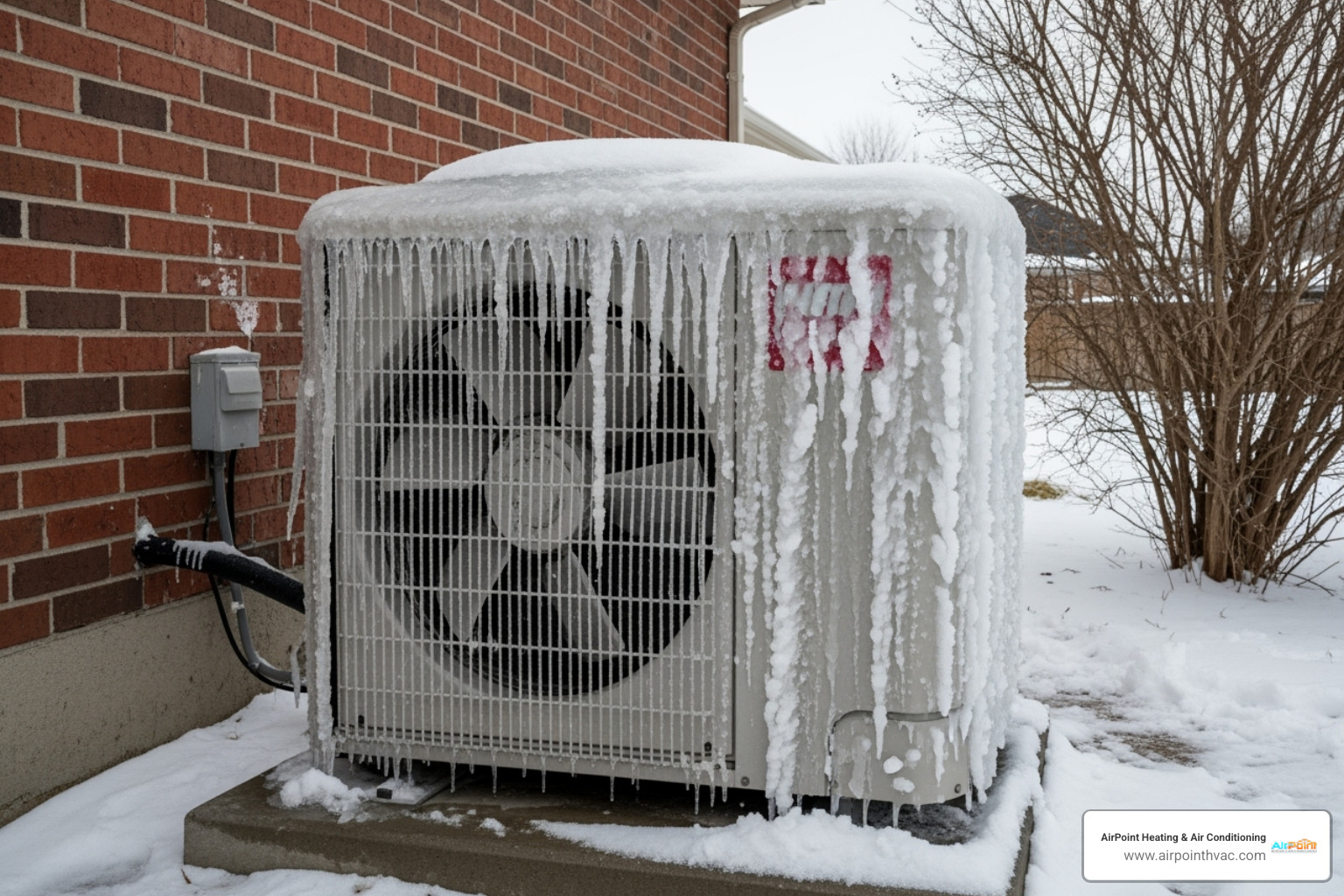
A failing compressor is like having a weak heart in your heat pump system. The compressor circulates refrigerant and maintains the pressure needed for heat exchange. When it starts failing, your system runs constantly trying to compensate, but never achieves proper heating or cooling. This is a serious mechanical issue that typically signals the need for major repair or system replacement.
Electrical problems can trick your system into thinking it should never stop running. A faulty blower relay switch might get stuck in the "on" position, keeping your indoor fan running regardless of what your thermostat says. Similarly, problems with the control board, wiring issues, or failed sensors can prevent your system from receiving proper shut-off signals.
An undersized heat pump is doomed to run constantly because it simply can't meet your home's heating and cooling demands. It's like trying to fill a swimming pool with a garden hose - technically possible, but it'll run forever without reaching the goal. This usually happens when systems are installed without proper load calculations for your home's specific needs.
Your home's insulation and air sealing play a huge role in heat pump performance. Poor insulation or air leaks around windows, doors, and the attic let conditioned air escape as fast as your system can produce it. Your heat pump responds by running constantly to replace the lost air, driving up energy bills while never achieving comfort.
Ductwork problems can waste enormous amounts of energy and force constant operation. According to ENERGY STAR, up to 30% of conditioned air can leak out through faulty ductwork. Disconnected ducts, holes, or poor insulation mean your heat pump is essentially heating or cooling the great outdoors. Leaky ducts are a major efficiency killer that professional sealing can fix.
Defrost cycle malfunctions can trap your system in problematic patterns during winter operation. If defrost controls or sensors fail, your unit might not defrost when needed, leading to ice buildup, or it could get stuck in defrost mode and run continuously without effective heating.
How to Prevent Your Heat Pump From Running Constantly
Nobody wants to deal with a heat pump keeps running situation, especially when it's driving up energy bills and wearing out your system. The good news is that most continuous running problems are completely preventable with the right approach to maintenance and home efficiency.
Think of prevention like taking care of your car - regular tune-ups and good driving habits keep you from being stranded on the side of the road. Your heat pump works the same way.
The Importance of Regular Professional Maintenance
Here's the truth: the single most effective way to prevent your heat pump from running constantly is regular professional maintenance. We've seen it countless times - homeowners who skip maintenance end up with systems that struggle, while those who stay on top of it enjoy years of reliable comfort.
Your heat pump should be professionally serviced twice a year - once in spring before the cooling season kicks in, and once in fall before you need heating. This isn't just a recommendation; it's essential for preventing the problems that cause constant running.
During these scheduled tune-ups, our technicians dive deep into your system. We clean both the indoor evaporator coil and outdoor condenser coil, which can accumulate dirt and grime that forces your unit to work overtime. When coils are dirty, heat transfer becomes inefficient, and your system runs constantly trying to compensate.
We also check refrigerant levels and inspect for leaks - low refrigerant is one of the top causes of continuous operation. Our technicians inspect all electrical connections too, because loose or corroded wiring can send mixed signals to your system, causing it to run when it should be resting.
The blower motor and fan get attention during maintenance visits, along with testing your thermostat for accuracy and verifying that the defrost cycle works properly for winter operation. All moving parts get lubricated to reduce friction and wear.
According to the Air Conditioning Contractors of America, this kind of professional maintenance can extend your system's life by up to 30% while maintaining peak efficiency. The Department of Energy provides excellent guidelines for comprehensive Professional heat pump maintenance that homeowners should understand.
Improving Home Efficiency to Reduce Strain
Your heat pump doesn't exist in isolation - it's working hard to condition the air in your home, and if that air keeps escaping, your system will run constantly trying to keep up. Improving your home's energy efficiency is like giving your heat pump a helping hand.
Proper insulation acts like a thermal blanket for your home, keeping heated or cooled air where it belongs. If your attic, walls, and crawl spaces aren't adequately insulated, your heat pump will run constantly trying to replace the conditioned air that's escaping. This is especially important in Los Alamitos, where temperature swings can put extra demand on your system.
Air leaks are sneaky energy thieves. Those small cracks around windows, doors, electrical outlets, and plumbing penetrations might not look like much, but they add up fast. Use caulk and weatherstripping to seal these gaps - you'll be amazed at the difference it makes.
Old, single-pane windows and poorly sealed doors are major culprits when it comes to energy loss. Upgrading to energy-efficient models can dramatically reduce the workload on your heat pump, allowing it to cycle normally instead of running constantly.
Don't forget about your ductwork either. Even the most efficient heat pump will struggle if your ducts are leaky. Having your ducts inspected and sealed ensures that conditioned air actually reaches its destination instead of being lost in unconditioned spaces like attics or crawl spaces.
When you create a more airtight and well-insulated environment, your heat pump doesn't have to work as hard to maintain comfortable temperatures. This means normal cycling instead of constant operation, lower energy bills, and a system that lasts longer. It's a win-win situation that pays dividends for years to come.
Frequently Asked Questions about Constantly Running Heat Pumps
What are the consequences of a heat pump that won't stop running?
When your heat pump keeps running constantly, it's not just making noise - it's creating real problems that can hit your wallet hard and damage your system. Think of it like a car engine that never turns off. Eventually, something's going to break.
The most immediate consequence you'll notice is skyrocketing energy bills. A heat pump that runs 24/7 consumes electricity around the clock, which can double or even triple your monthly utility costs. We've seen homeowners get shocked by bills that suddenly jumped from $150 to $400 per month.
But the financial pain doesn't stop there. Constant operation puts tremendous stress on your heat pump's vital components, especially the compressor and fan motor. These parts are designed to cycle on and off throughout the day, giving them time to rest and cool down. When they never get a break, they wear out much faster than they should.
The compressor is particularly vulnerable - it's essentially the heart of your heat pump. When it fails from overwork, you're looking at a major repair that can cost thousands of dollars. Even smaller components like fan motors and electrical relays will burn out prematurely under constant use.
Perhaps most frustrating of all, a heat pump that runs constantly often isn't even doing its job effectively. You might be paying more for electricity while your home stays uncomfortably warm in summer or cold in winter. It's the worst of both worlds - higher bills and less comfort.
How does an incorrectly sized heat pump affect its run time?
The size of your heat pump has everything to do with how often it runs. Getting the size wrong is like trying to fill a swimming pool with a garden hose or using a fire hose to water a flower pot - neither works well.
An undersized heat pump is the most common culprit behind constant running. If your unit is too small for your home, it's like asking a compact car to tow a trailer up a mountain. It'll try its best, but it just doesn't have the capacity to get the job done efficiently.
This undersized system will run almost non-stop, desperately trying to reach your thermostat setting but never quite getting there. In summer, your home might hover at 76°F when you've set the thermostat to 72°F. In winter, you might feel chilly even though the system hasn't stopped running all day.
On the flip side, an oversized heat pump creates different problems. While it won't typically run constantly, it will "short-cycle" - turning on and off rapidly in quick bursts. This happens because the oversized unit cools or heats your space too quickly, then shuts off before it can properly remove humidity from the air.
The result? Your home might reach the right temperature but feel clammy and uncomfortable. Plus, all that starting and stopping puts just as much wear on the system as constant running would.
Proper sizing requires a professional load calculation that considers your home's square footage, insulation levels, window types, and even which direction your house faces. It's not something you can determine by guessing or using rough rules of thumb.
How often should my heat pump be serviced to prevent problems?
The secret to preventing your heat pump keeps running issues is regular professional maintenance - and we mean twice a year, not just when something breaks.
Schedule your first service call in spring, before the weather gets hot and you're relying on your system for cooling. This tune-up focuses on preparing your heat pump for the demanding summer months ahead. Your technician will clean the outdoor coils, check refrigerant levels, and make sure everything is ready for peak cooling season.
The second service should happen in fall, before you need heating. This is especially important because winter operation puts different stresses on your heat pump. The technician will test the defrost cycle, inspect the auxiliary heat strips, and ensure your system can handle cold weather efficiently.
During each visit, a qualified technician will perform a comprehensive check that includes cleaning both indoor and outdoor coils, checking electrical connections, lubricating moving parts, and testing all safety controls. They'll also verify that your thermostat is working correctly and that refrigerant levels are where they should be.
This preventive approach can extend your heat pump's life by up to 30% while keeping it running efficiently. More importantly, it catches small problems before they turn into expensive emergencies. A loose electrical connection finded during routine maintenance might cost $50 to fix. If it's left alone until it causes your compressor to fail, you could be looking at a $3,000 repair bill.
Think of it like getting regular oil changes for your car - it's a small investment that prevents much bigger problems down the road. And in Los Alamitos, where we depend on our HVAC systems year-round, that regular maintenance is absolutely essential for reliable comfort.
Conclusion: Restore Your Comfort and Peace of Mind
When your heat pump keeps running constantly, it's sending you a message that something needs attention. While we've learned that some continuous operation is perfectly normal during those chilly winter months when temperatures drop below 40 degrees, there's a clear difference between normal operation and a system crying for help.
Throughout this guide, we've uncovered the most common culprits behind a constantly running heat pump. Sometimes it's as simple as a dirty air filter choking your system or incorrect thermostat settings with the fan stuck on "ON" instead of "AUTO." Other times, the issue runs deeper - low refrigerant levels, frozen coils, or even an undersized system that's simply too small for your home's needs.
The key is knowing when you can tackle the problem yourself and when it's time to call in the professionals. Start with the simple fixes we've outlined: check that air filter, verify your thermostat settings, clear any debris around your outdoor unit, and make sure all your vents are open and unobstructed.
But if your heat pump is still running non-stop after these basic checks, or if you notice ice buildup that won't clear, strange noises, or energy bills that make you wince, it's definitely time for expert diagnosis. These warning signs often point to mechanical or electrical issues that require professional attention to prevent costly damage.
At AirPoint Heating & Air Conditioning, we understand how frustrating a malfunctioning heat pump can be. Our family-owned business has built its reputation on providing fast, expert HVAC services throughout Los Alamitos and the surrounding areas. We believe in getting to the root of the problem quickly, whether it's a simple repair or a more complex system issue.
Don't let a heat pump that keeps running constantly drain your wallet or compromise your family's comfort. Our award-winning team offers comprehensive heat pump repairs and maintenance with a 100% satisfaction guarantee, ensuring your system operates efficiently and reliably.
Ready to restore your peace of mind and get your heat pump back on track? Schedule expert heat pump service in Huntington Beach today and experience the difference that professional, caring service makes.
Other Blogs
Latest Blog Posts
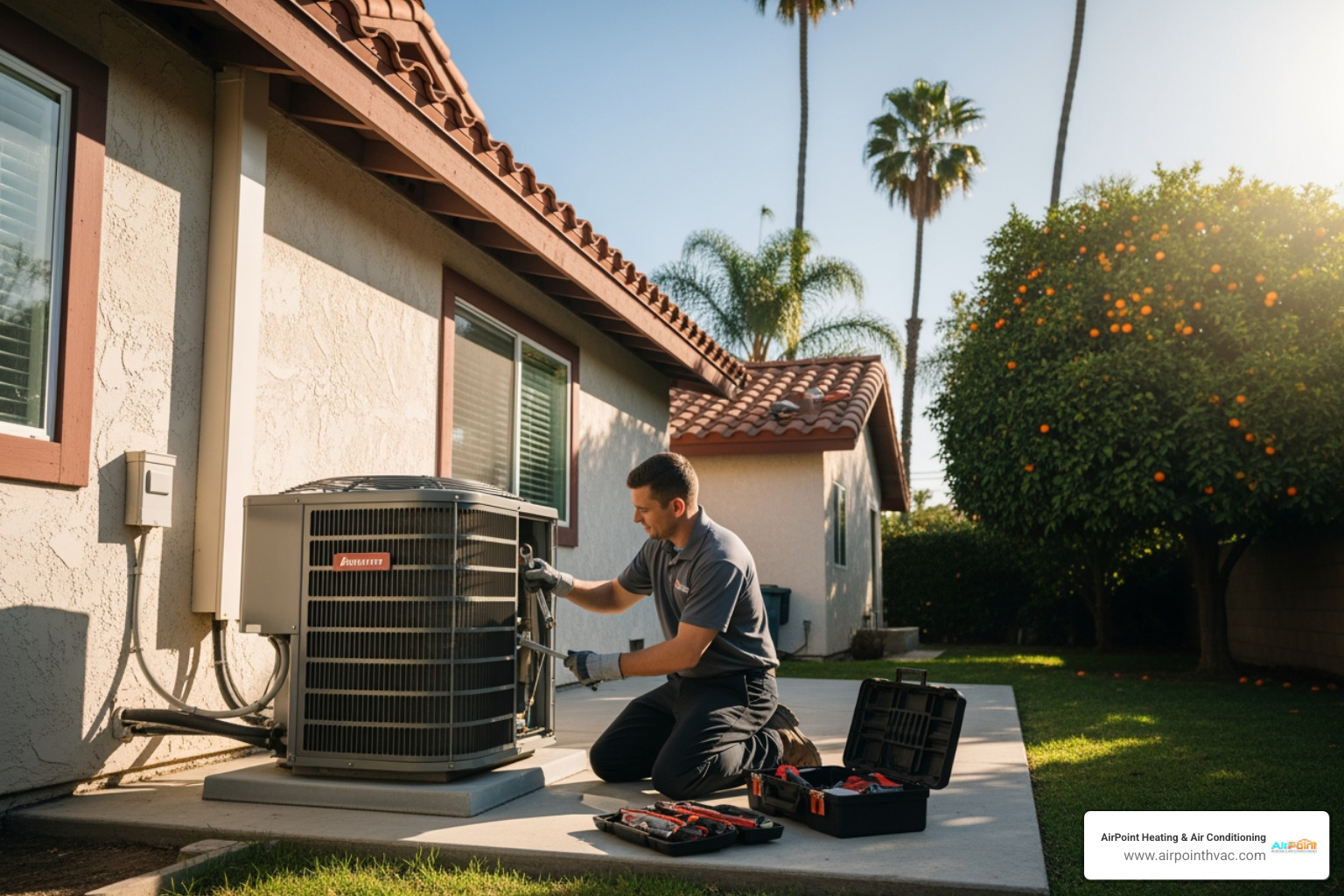
Keep Your Cool: The Ultimate Guide to AC Tune-Up Services in Anaheim, CA
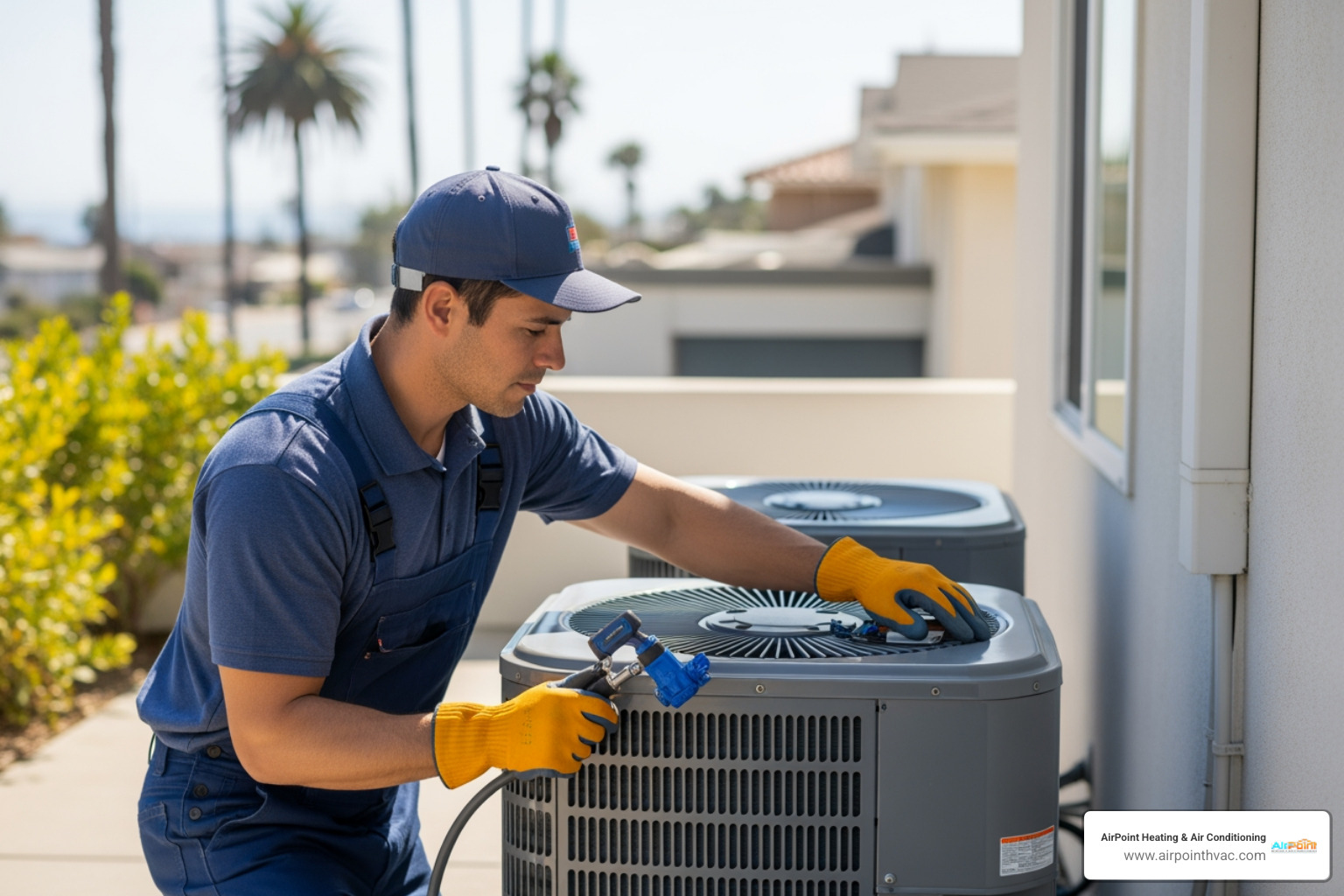
Keep Your Cool: Top-Rated & Affordable AC Tune-Ups in Laguna Beach, CA
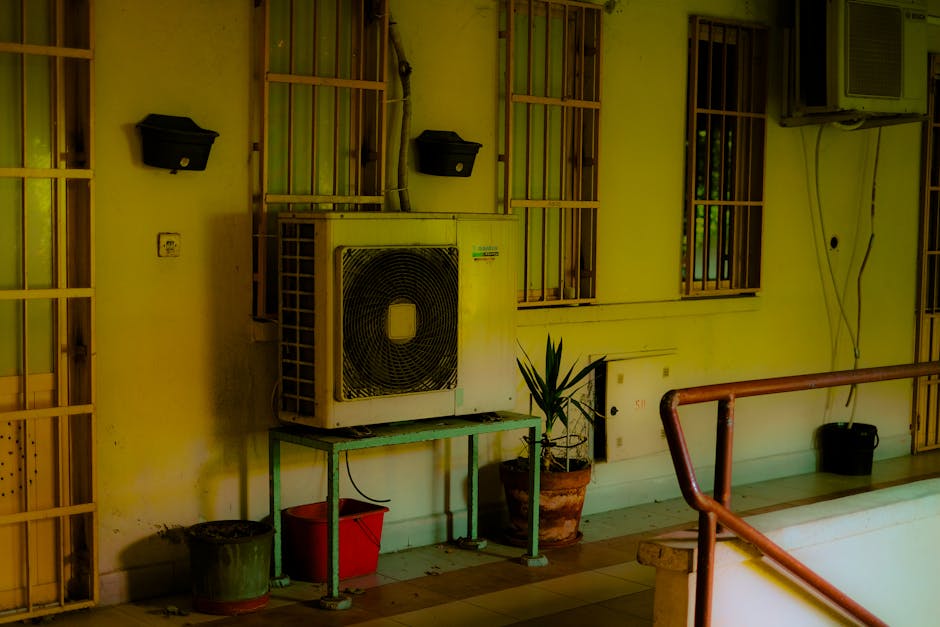
Cerritos AC Installation: Uncovering the Best Deals
Customer Testimonials










